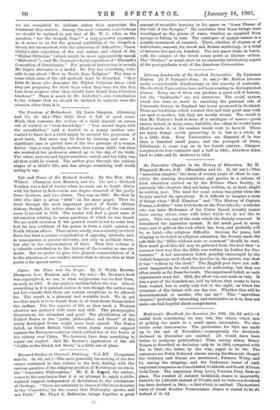An Unwritten Chapter in the History of Education. By H.
Kingsmill Moore, D.D. (Macmillan and Co. 7s. Gd. net.)—This " unwritten chapter," the story of twenty years of effort to con- ciliate the warring denominations and parties in a scheme of Irish education carried on by the Kildare Place Society, is curiously like chapters that are being written, or, at least, might be written, now. The need for some action was great when the Society started its operations. It is difficult to imagine a state of things when " Moll Flanders" and "The History of Captain Freney, a Robber" were text-books at the Free schools,—a scholar who was later Moderator of the Ulster Synod actually names these among others, some with titles which we do not like to quote. This was one of the evils which the Society removed. It introduced the Lancaster system. It did much good in many ways, and it split on the rock which has been, and probably will be, so fatal,—the religious difficulty. Anxious for peace, but clinging to its belief in religious education, the Society made the rule that the "Bible without note or comment" should be read. How much good this did may be gathered from the fact that "a common view was that the Bible was written by Luther for Pro- testants." A not uncommon belief, possibly encouraged by the violent language used about the practice by the priests, was that it was " written by the devil." The English poor have not suffi- cient imagination for such theories of authorship, but they are often nearly as far from the truth. The experiment failed, as such experiments must fail. Still, the effort was not made in vain. It was a part of the foundations, laid by labour that seems to have been wasted, but is really only lost to the sight, on which the structure of the future will one day rise. Whether this will be denominational or secular, who can say ? This " unwritten chapter," profoundly interesting and instructive as it is, does not make one feel hopeful about compromises.






































 Previous page
Previous page